4英文翻译
CET-4翻译
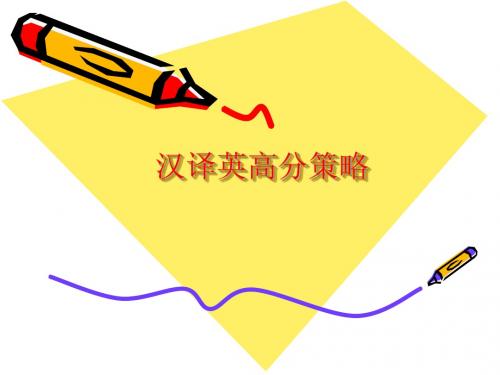
• 对于四级的翻译,考生可以遵照一个通用的四步法则 来进行,即首先读全原句(英文和中文),找出主干; 第二,翻译主干;第三,添加枝叶;最后,通读全句, 检查错误。 • 在这里需要强调的是,在翻译之前一定要读全原句, 并且英文和中文都要细读。为什么要细读英文,因为 其中很可能会隐含一些题眼。如:Having spent some time in the city, he had no trouble ______(找到去 历史博物馆的路)。如果不读完全句,你很有可能会 忽视短语have no trouble 后面接(in) doing。另外, 考生需要注意的是,考试时切忌在没有理解清楚句义 的情况下就执笔翻译。此题在执笔翻译之前应该先抓 出本句的主干,即“ 找到…路”, find the way to; 而枝叶是“历史博物馆”, history museum;最后拼 接在一起,即 (in) finding the way to the history museum
• 4.(0606-No.88) ___________(为了挣钱供 我上学),Mother often takes on more work than is good for her. • ( In order to support my university studies; to finance my education; to pay for my education; to pay my tuition fees) • 5.(0612-No.87)Specialists in intercultural studies says that it is not easy to __________ (适应不同文化中的生活) • (adapt oneself to life/living in different cultures) • 6.(0612-No.91)The nation’s population contimues to rise __________(以每年1200万人 的速度) • ( at a speed / rate of 12 million per year 或 at an annual speed of 12 million)
全新版大学英语4课后翻译中英文
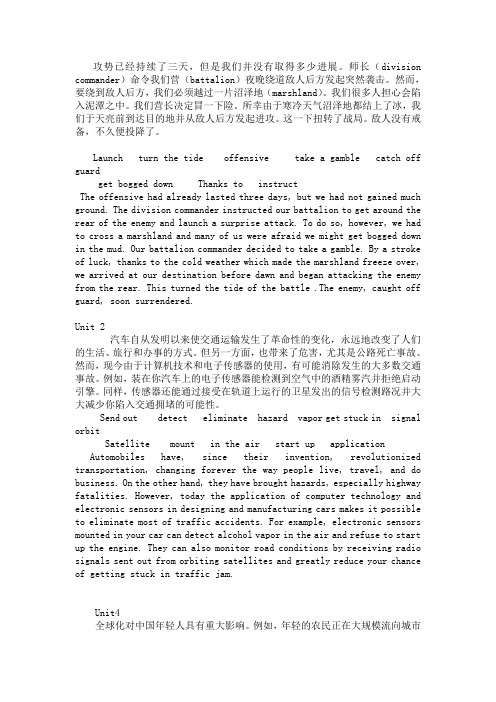
攻势已经持续了三天,但是我们并没有取得多少进展。
师长(division commander)命令我们营(battalion)夜晚绕道敌人后方发起突然袭击。
然而,要绕到敌人后方,我们必须越过一片沼泽地(marshland)。
我们很多人担心会陷入泥潭之中。
我们营长决定冒一下险。
所幸由于寒冷天气沼泽地都结上了冰,我们于天亮前到达目的地并从敌人后方发起进攻。
这一下扭转了战局。
敌人没有戒备,不久便投降了。
Launch turn the tide offensive take a gamble catch off guardget bogged down Thanks to instructThe offensive had already lasted three days, but we had not gained much ground. The division commander instructed our battalion to get around the rear of the enemy and launch a surprise attack. To do so, however, we had to cross a marshland and many of us were afraid we might get bogged down in the mud. Our battalion commander decided to take a gamble. By a stroke of luck, thanks to the cold weather which made the marshland freeze over, we arrived at our destination before dawn and began attacking the enemy from the rear. This turned the tide of the battle .The enemy, caught off guard, soon surrendered.Unit 2汽车自从发明以来使交通运输发生了革命性的变化,永远地改变了人们的生活、旅行和办事的方式。
四4从中英文数字的异同谈其互译策略

从中英文数字的异同谈其互译策略由于民族、XX的不同及文化的差异,人们对数字的表达也就有所不同。
例如英语中的“The seven Virtues”、“The Seven Heavens”等就是受西方XX的影响,因seven 发音似heaven而为人们喜爱,而许多西方人不喜欢“thirteen”,缘自《圣经》故事。
中国人乐意使用数字“八”和“九”,因它们与“发”“久”谐音,人们认为六六顺,数字“六”因而被多数人喜爱,“一六八”(“一路发”)作为、手机、车牌更是人们的首选,甚至身价高于其它数字上百元,也是可以理解的。
当然,数字“四”(音似“死”)自然被人所忌讳。
文化来自生活,语言反映人们的生活。
一些数字表达法与人们的生活经历息息相关。
汉语里“三下五除二”与中国的算盘有关,用来指人办事雷厉风行。
同样英语中也存在一些这样的数字表达法,“one-two”、“three-quarter”、“four-some”、“fives”、“the Eights”“nine-pins”及“ten-pins”等都与他们的体育项目相关,反映英语国家人们的生活与文化。
(拳击中左右猛击,足球中踢墙传球二过一,迅速的反应;=three-quarter back橄榄球中的中卫;高尔夫的双打,a mixed four-some混合双打;八浆划船比赛;=nine-pin bowling)一、中英文数字在语用上的异同同一数字在用法上意义并不是一成不变的,就说汉语数字“三”的含义就有几种,如“三言两语”、“三寸金莲”中的“三”表示“少”、“短”,而在“三令五申”中则表示“多次”,但在“三长两短”的“三”意为“一旦、万一”。
相同数字所表达的意思为何会有差异甚至相反呢?数字“三”本意表示“少”,因它仅多于“一”“二”,所以与“千言万语”相比,“三言两语”中的“三”意为“少”,但相对“一心一意”而言,在“三心二意”里则为“多”。
在英文中“three”源于概念“three-dimension”(三维),给人们以真实之感,另外,“three”还可表示混乱之意,如“three-ring circus”、“Three in one(宗:三位一体)”、“three sheets in the wind(俚:大醉)”。
常用单位的中英文对照翻译
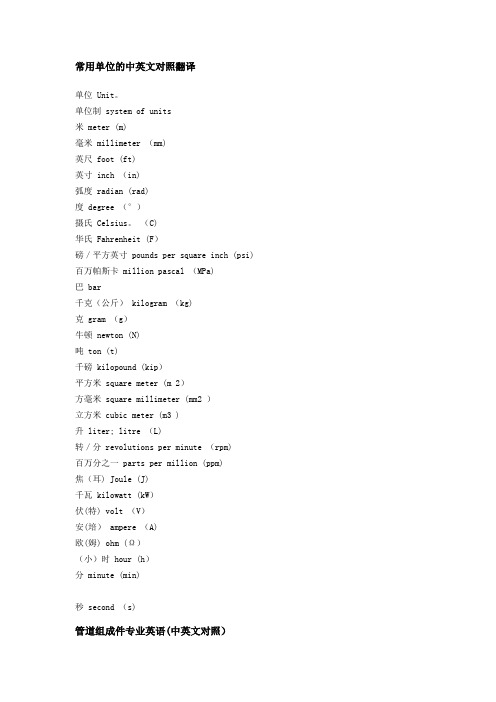
常用单位的中英文对照翻译单位 Unit。
单位制 system of units米 meter (m)毫米 millimeter (mm)英尺 foot (ft)英寸 inch (in)弧度 radian (rad)度 degree (°)摄氏 Celsius。
(C)华氏 Fahrenheit (F)磅/平方英寸 pounds per square inch (psi) 百万帕斯卡 million pascal (MPa)巴 bar千克(公斤) kilogram (kg)克 gram (g)牛顿 newton (N)吨 ton (t)千磅 kilopound (kip)平方米 square meter (m 2)方毫米 square millimeter (mm2 )立方米 cubic meter (m3 )升 liter; litre (L)转/分 revolutions per minute (rpm)百万分之一 parts per million (ppm)焦(耳) Joule (J)千瓦 kilowatt (kW)伏(特) volt (V)安(培) ampere (A)欧(姆) ohm (Ω)(小)时 hour (h)分 minute (min)秒 second (s)管道组成件专业英语(中英文对照)1 管道组成件 Piping component1。
1 管子 Pipe管子(按照配管标准规格制造的) pipe管子(不按配管标准规格制造的其他用管) tube钢管 steel pipe铸铁管 cast iron pipe衬里管 lined pipe复合管 clad pipe碳钢管 carbon steel pipe合金钢管 alloy steel pipe不锈钢 stainless steel pipe奥氏体不锈钢管 austenitic stainless steel pipe铁合金钢管 ferritic alloy steel pipe轧制钢管 wrought—steel pipe锻铁管 wrought—iron pipe无缝钢管 seamless (SMLS) steel pipe焊接钢管 welded steel pipe电阻焊钢管 electric—resistance welded steel pipe电熔(弧)焊钢板卷管 electric-fusion (arc)-welded steel—plate pipe 螺旋焊接钢管 spiral welded steel pipe镀锌钢管 galvanized steel pipe热轧无缝钢管 hot-rolling seamless pipe冷拔无缝钢管 cold-drawing seamless pipe水煤气钢管 water-gas steel pipe塑料管 plastic pipe玻璃管 glass tube橡胶管 rubber tube直管 run pipe; straight pipe1.2 管件 Fitting弯头 elbow异径弯头 reducing elbow带支座弯头 base elbowk半径弯头 long radius elbow短半径弯头 short radius elbow长半径180°弯头 long radius return短半径180°弯头 short radius return带侧向口的弯头(右向或左向) side outlet elbow (right hand or left hand)双支管弯头(形) double branch elbow三通 tee异径三通 reducing tee等径三通 straight tee带侧向口的三通(右向或左向) side outlet tee (right hand or 1eft hand)异径三通(分支口为异径) reducing tee (reducing on outlet)异径三通(一个直通口为异径)reducing tee (reducing on one run)带支座三通 base tee异径三通(一个直通口及分支口为异径) reducing tee (reducing on one run and outlet) 异径三通(两个直通口为异径,双头式) reducing tee (reducing on both runs, bull head)45°斜三通45° lateral45°斜三通(支管为异径)45° lateral (reducing on branch)45°斜三通(一个直通口为异径) 45° lateral (reducing on one run)45°斜三通(一个直通口及支管为异径) 45° lateral (reducing on one run and branch)Y型三通(俗称裤衩)true “Y”四通 cross等径四通 straight cross异径四通 reducing cross异径四通(一个分支口为异径)reducing cross (reducing on one outlet)异径四通(一个直通口及分支口为异径) reducing cross (reducing on one run and outlet) 异径四通(两个分支口为异径) reducing cross (reducing on both outlet)异径四通(一个直通口及两个分支口为异径) reducing cross (reducing on one run and both outlet)异径管 reducer同心异径管 concentric reducer偏心异径管 eccentric reducer锻制异径管 reducing swage螺纹支管台 threadolet焊接支管台 weldolet承插支管台 sockolet弯头支管台 elbolet斜接支管台 latrolet镶入式支管嘴 sweepolet短管支管台 nipolet支管台. 插入式支管台 boss管接头 coupling, full coupling半管接头 half coupling异径管接头 reducing coupling活接头 union内外螺纹缩接(俗称补芯) bushing管帽 cap (C)堵头 plug短节 nipple异径短节 reducing nipple; swage nipple1.3 弯管 Bend预制弯管 fabricated pipe bend跨越弯管(^ 形) cross—over bend偏置弯管(” 形) offset bend90°弯管 quarter bend环形弯管 cirele bend单侧偏置90°弯管(? 形) single offset quarter bendS形弯管“S” bend单侧偏置U形膨胀弯管(| ?形)single offset “U” bendU形弯管“U" bend双偏置U膨胀弯管double offset expansion “U” bend斜接弯管 mitre bend三节斜接弯管 3-piece mitre bend折皱弯管 corrugated bend圆度 roundness1。
各种头衔最的英文翻译

各种头衔最的英文翻译一、常见头衔的英文翻译1. 董事长:Chairman2. 总经理:General Manager3. 副总经理:Deputy General Manager4. 部门经理:Department Manager5. 项目经理:Project Manager6. 经理助理:Manager Assistant7. 人力资源经理:Human Resources Manager8. 财务经理:Finance Manager9. 市场经理:Marketing Manager10. 销售经理:Sales Manager二、其他常见头衔的英文翻译1. 教授:Professor2. 副教授:Associate Professor3. 讲师:Lecturer4. 助教:Teaching Assistant5. 医生:Doctor6. 护士:Nurse7. 律师:Lawyer8. 工程师:Engineer9. 程序员:Programmer10. 设计师:Designer三、特殊头衔的英文翻译1. 院士:Academician2. 博士:Doctor3. 硕士:Master4. 学士:Bachelor5. 诺贝尔奖得主:Nobel Prize Winner6. 奥斯卡奖得主:Oscar Winner7. 金球奖得主:Golden Globe Winner8. 著名演员:Famous Actor9. 著名导演:Famous Director10. 著名歌手:Famous Singer各种头衔最的英文翻译一、常见头衔的英文翻译1. 董事长:Chairman2. 总经理:General Manager3. 副总经理:Deputy General Manager4. 部门经理:Department Manager5. 项目经理:Project Manager6. 经理助理:Manager Assistant7. 人力资源经理:Human Resources Manager8. 财务经理:Finance Manager9. 市场经理:Marketing Manager10. 销售经理:Sales Manager二、其他常见头衔的英文翻译1. 教授:Professor2. 副教授:Associate Professor3. 讲师:Lecturer4. 助教:Teaching Assistant5. 医生:Doctor6. 护士:Nurse7. 律师:Lawyer8. 工程师:Engineer9. 程序员:Programmer10. 设计师:Designer三、特殊头衔的英文翻译1. 院士:Academician2. 博士:Doctor3. 硕士:Master4. 学士:Bachelor5. 诺贝尔奖得主:Nobel Prize Winner6. 奥斯卡奖得主:Oscar Winner7. 金球奖得主:Golden Globe Winner8. 著名演员:Famous Actor9. 著名导演:Famous Director10. 著名歌手:Famous Singer四、政治及军事头衔的英文翻译1. 总统:President2. 副总统:Vice President3. 首相:Prime Minister4. 副首相:Deputy Prime Minister5. 国防部长:Minister of Defense6. 外交部长:Minister of Foreign Affairs7. 内政部长:Minister of Interior8. 教育部长:Minister of Education9. 财政部长:Minister of Finance10. 军官:Officer五、企业及组织头衔的英文翻译1. 首席执行官:Chief Executive Officer (CEO)2. 首席运营官:Chief Operating Officer (COO)3. 首席财务官:Chief Financial Officer (CFO)4. 首席信息官:Chief Information Officer (CIO)5. 首席市场官:Chief Marketing Officer (CMO)6. 首席技术官:Chief Technology Officer (CTO)7. 首席人力资源官:Chief Human Resources Officer (CHRO)8. 会长:President9. 秘书长:SecretaryGeneral10. 主任:Director各种头衔最的英文翻译一、常见头衔的英文翻译1. 董事长:Chairman2. 总经理:General Manager3. 副总经理:Deputy General Manager4. 部门经理:Department Manager5. 项目经理:Project Manager6. 经理助理:Manager Assistant7. 人力资源经理:Human Resources Manager8. 财务经理:Finance Manager9. 市场经理:Marketing Manager10. 销售经理:Sales Manager二、其他常见头衔的英文翻译1. 教授:Professor2. 副教授:Associate Professor3. 讲师:Lecturer4. 助教:Teaching Assistant5. 医生:Doctor6. 护士:Nurse7. 律师:Lawyer8. 工程师:Engineer9. 程序员:Programmer10. 设计师:Designer三、特殊头衔的英文翻译1. 院士:Academician2. 博士:Doctor3. 硕士:Master4. 学士:Bachelor5. 诺贝尔奖得主:Nobel Prize Winner6. 奥斯卡奖得主:Oscar Winner7. 金球奖得主:Golden Globe Winner8. 著名演员:Famous Actor9. 著名导演:Famous Director10. 著名歌手:Famous Singer四、政治及军事头衔的英文翻译1. 总统:President2. 副总统:Vice President3. 首相:Prime Minister4. 副首相:Deputy Prime Minister5. 国防部长:Minister of Defense6. 外交部长:Minister of Foreign Affairs7. 内政部长:Minister of Interior8. 教育部长:Minister of Education9. 财政部长:Minister of Finance10. 军官:Officer五、企业及组织头衔的英文翻译1. 首席执行官:Chief Executive Officer (CEO)2. 首席运营官:Chief Operating Officer (COO)3. 首席财务官:Chief Financial Officer (CFO)4. 首席信息官:Chief Information Officer (CIO)5. 首席市场官:Chief Marketing Officer (CMO)6. 首席技术官:Chief Technology Officer (CTO)7. 首席人力资源官:Chief Human Resources Officer (CHRO)8. 会长:President9. 秘书长:SecretaryGeneral10. 主任:Director六、教育领域头衔的英文翻译1. 校长:Principal2. 副校长:Vice Principal3. 教授:Professor4. 副教授:Associate Professor5. 讲师:Lecturer6. 助教:Teaching Assistant7. 学生会主席:Student Council President8. 学生会副主席:Vice President of Student Council9. 班级代表:Class Representative10. 学习委员:Academic Committee Member七、艺术及文化领域头衔的英文翻译1. 艺术家:Artist2. 作家:Writer3. 画家:Painter4. 书法家:Calligrapher5. 音乐家:Musician6. 歌手:Singer7. 演员:Actor8. 导演:Director9. 编舞:Choreographer10. 主持人:Host。
几乎所有食物的英文翻译
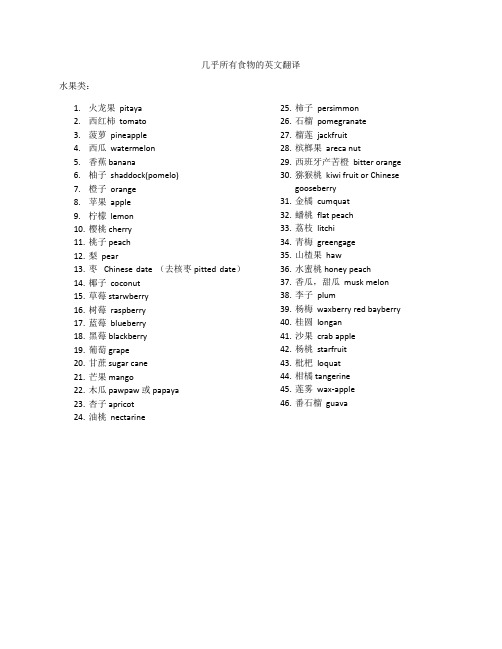
几乎所有食物的英文翻译水果类:1.火龙果 pitaya2.西红柿 tomato3.菠萝 pineapple4.西瓜 watermelon5.香蕉 banana6.柚子 shaddock(pomelo)7.橙子 orange8.苹果 apple9.柠檬 lemon10.樱桃 cherry11.桃子 peach12.梨 pear13.枣Chinese date (去核枣pitted date)14.椰子 coconut15.草莓 starwberry16.树莓 raspberry17.蓝莓 blueberry18.黑莓 blackberry19.葡萄 grape20.甘蔗 sugar cane21.芒果 mango22.木瓜 pawpaw 或 papaya23.杏子 apricot24.油桃 nectarine 25.柿子 persimmon26.石榴 pomegranate27.榴莲 jackfruit28.槟榔果 areca nut29.西班牙产苦橙 bitter orange30.猕猴桃 kiwi fruit or Chinesegooseberry31.金橘 cumquat32.蟠桃 flat peach33.荔枝 litchi34.青梅 greengage35.山楂果 haw36.水蜜桃 honey peach37.香瓜,甜瓜 musk melon38.李子 plum39.杨梅 waxberry red bayberry40.桂圆 longan41.沙果 crab apple42.杨桃 starfruit43.枇杷 loquat44.柑橘 tangerine45.莲雾 wax-apple46.番石榴 guava肉、蔬菜类(livestock家蓄):1.南瓜(倭瓜)pumpkin cushaw2.甜玉米 Sweet corn3.牛肉 beef4.猪肉 pork5.羊肉 mutton6.羔羊肉 lamb7.鸡肉 chicken8.生菜/莴苣 lettuce9.白菜 Chinese cabbage(celerycabbage)10.卷心菜(甘蓝)cabbage11.萝卜 radish12.胡萝卜 carrot13.韭菜 leek14.木耳 agarics15.豌豆 pea16.马铃薯(土豆)potato17.黄瓜 cucumber18.苦瓜 balsam pear19.秋葵 okra20.洋葱 onion21.芹菜 celery22.芹菜杆 celery sticks23.地瓜 sweet potato24.蘑菇 mushroom25.橄榄 olive26.菠菜 spinach27.冬瓜(Chinese)wax gourd 28.莲藕 lotus root29.紫菜 laver30.油菜 cole rape31.茄子 eggplant32.香菜 caraway33.青椒 green pepper34.四季豆 / 青刀豆 garden bean35.银耳 silvery fungi36.腱子肉 tendon37.肘子 pork joint38.茴香 fennel(茴香油fennel oil 药用)39.鲤鱼 carp40.咸猪肉 bacom41.金针菇 needle mushroom42.扁豆 lentil43.槟榔 areca44.牛蒡 great burdock45.水萝卜 summer radish46.竹笋 bamboo shoot47.艾蒿 Chinese mugwort48.绿豆 mung bean49.毛豆 green soy bean50.瘦肉 lean meat51.肥肉 speck52.黄花菜 day lily (day lily bud)53.豆芽菜 bean sprout54.丝瓜 towel gourd(注:在美国丝瓜或用来做丝瓜茎loofah洗澡的,不是食用的。
【课文翻译】四年级上册英语课文中英文对照翻译-Unit4Myhome人教PEP

Unit 4 My homeUnit 4 My home 我的家Mum, where are my crayons? 妈妈,我的蜡笔在哪呢?Are they in the study? 在你书房里吗?Where's the cat, Dad? 爸爸,猫在哪?Is she in the kitchen? 在厨房吗?Oh, no! 哦,不!Zip, your living room is nice. 吉普,你的客厅好棒。
Zip is in the bathroom. 吉普在浴室。
I'm her sister. 我是他妹妹。
Unit 4 A Let's talk 一起说吧I have a cat. She's cute. 我有一只猫。
她很可爱。
Where is she? 她在哪?Mmm. Is she in the living room? 嗯。
在客厅吗?No, she isn't. 不,不在。
Is she in the study? 在书房吗?No, she isn't. 不,不在。
Look! She's in the kitchen. 看!她在厨房。
Unit 4 A Let's learn 一起学吧Where's Amy? 艾米在哪?Is she in the study? 她在书房吗?Yes, she is. 是的,她在。
bedroom 卧室living room 客厅study 书房kitchen 厨房bathroom 浴室Unit 4 A Let's do 一起做吧Go to the living room, 去客厅,Watch TV. 看电视。
Go to the study. 去书房。
Read a book. 看书。
Go to the kitchen. 去厨房。
Have a snack. 吃点心。
Go to the bedroom. 去卧室。
英文4怎么写

1.1.2.3.4.5.6.7.8.9.10英文怎么写1——one(英 [wʌn] 美 [wʌn] ) 2——two(英 [tu:] 美 [tu] ) 3——three(英 [θri:] 美[θri] ) 4——four(英 [fɔ:(r)] 美 [fɔr] ) 5——five(英 [faɪv] 美 [faɪv] ) 6——six(英 [sɪks] 美 [sɪks] ) 7——seven(英 [ˈsevn] 美 [ˈsɛvən] ) 8——eight(英 [eɪt] 美 [et] ) 9——nine(英[naɪn] 美 [naɪn] ) 10——ten(英 [ten] 美 [tɛn] ) 1,2,3,4,5,6,7,8,9,10属于阿拉伯数字,最初由古印度人发明,后由阿拉伯人传向欧洲,之后再经欧洲人将其现代化。
采取位值法,高位在左,低位在右,从左往右书写。
借助一些简单的数学符号(小数点、负号、百分号等),可以明确的表示所有的有理数。
用来指代前文提到的同类但不是同一个的可数名词(如果是不可数名词用that);表示泛指,可作前置定语或后置定语,也可单独使用。
2、two:二;两个。
也可作形容词有两个的意思。
You have your choice between the two. 在这两个之中,你有选择权。
3、three:可以用作数词和名词,可翻译为三、三个,等等。
She is the youngest of us three.她是我们三人中间最年轻的。
2.英文序数词11-100的序数词分为四个类.1、第一类 first (1st) 第一 second (2nd) 第二 third (3rd) 第三(在括号里的是缩写形式,均在阿拉伯数字后面加上相应序数词的最后两个字母构成,以下各类与此相同.)这类序数词只有三个,在整个序数词里面是特殊的,就和第一类基数词一样,需要逐个地硬记下来.2、第二类:fourth (4th) 第四 fifth (5th) 第五 sixth (6th) 第六 seventh (7th) 第七eighth (8th) 第八 ninth (9th) 第九 tenth (10th) 第十 eleventh (11th) 第十一 twelfth (12th) 第十二 thirteenth (13th) 第十三 fourteenth (14th) 第十四 fifteenth (15th) 第十五 sixteenth (16th) 第十六 seventeenth (17th) 第十七 eighteenth (18th) 第十八 nineteenth (19th) 第十九这一类序数词共有十六个.均在相应的基数词后面加上后缀-th构成.要注意其中fifth、eighth、ninth、twelth四个词的拼法.3、第三类:twentieth (20th) 第二十 thirtieth (30th) 第三十 fortieth (40th) 第四十 fiftieth (50th) 第五十 sixtieth (60th) 第六十 seventieth (70th) 第七十 eightieth (80th) 第八十 ninetieth (90th) 第九十这一类全是十位整数的序数词,共八个.它们的构成方法是:先将相应的十位整数的基数词词尾-ty中的y改成i,然后在加上后缀-eth.4、第四类:thirty-first (31th) 第三十一 sixty-second (62nd) 第六十二 eighty-seventh (87th) 第八十七 ninety-eighth (98th) 第九十八这类表示“第几十几”的序数词,跟表示“几十几”的基数词一样简单.在构成方法上均由基数词“几十几”变化而来,十位数不变,仅把个位上的基数词变成序数词就行了.。
汉英数字4的文化内涵对比及翻译

汉英数字4的文化内涵对比及翻译
在中国文化中,数字4被认为是不吉利的数字。
这是因为它的发音(“四”)和“死”的发音很相似,因此被认为带有负面意义。
因此,在中国,很多人会避免使用数字4,例如不愿意住在4楼或者不愿意买4号车牌。
在英文文化中,数字4并没有这样的负面意义。
它只是一个普通的数字,没有任何负面的文化内涵。
在翻译中,这个差异需要注意。
如果将中文文本直接翻译成英文,可能会导致误解。
例如,如果有一个中文文本说“我不想住在4楼”,在直接翻译成英文之后就变成了“I don't want to live on the fourth floor”。
但是,对于英文读者来说,这句话没有任何问题,因为他们并不会将4视为不吉利的数字。
为了避免这种误解,翻译人员需要注意文化差异,并在必要时对原文进行适当的修改,以便让目标语言的读者理解原意。
例如,在这种情况下,翻译人员可能会选择将“4楼”翻译成“the fourth floor”,同时在后面加上一句话来解释这个数字在中文文化中的负面意义,如“(注意:在中国文化中,数字4被认为是不吉利的)”。
这样,英文读者就能理解为什么这个人不想住在4楼,而不会因为文化差异而产生误解。
总之,数字4在中文文化和英文文化中的文化内涵是不同的。
在翻译过程中,翻译人员需要注意这种差异,并在必要时进行适当的修改,以便使原意得到准确传达。
人教版PEP英语五年级(上)Unit4 (含视频、翻译、知识点、练习)

人教版PEP英语五年级(上)Unit4 (含视频、翻译、知识点、练习)Unit4教材第36页课文翻译We'll have an English party next Tuesday.我们下个星期二将要举办一个英语聚会。
Great!太好了!What can you do for the party?你能为聚会做什么?I can play the pipa.我会弹琵琶。
Wonderful!好极了!I can dance!我会跳舞!I can sing! La la la...我会唱歌!啦啦啦……Unit4教材第37页课文翻译Hi.Mr Li.嗨,李老师。
Hi.Can you play ping-pong?嗨。
你会打乒乓球吗?A little.会一点儿。
Let's play together!让我们一起玩吧!Sorry.I have an English class at 3 0'clock.对不起。
我在三点钟有一节英语课。
关注ABC小学英语,获取更多资料。
Unit4教材A部分课文翻译1Let's try部分翻译What can Mike do? Listen and tick.迈克能做什么?听一听并打钩。
Chen Jie:Hi,Mike.We'll have an English party next Tuesday!陈杰:你好,迈克。
下周二我们将举行一次英语晚会!Mike:Great!I like parties!迈克:太好了!我喜欢聚会!Chen Jie:What can you do for the parly?陈杰:你能为聚会做什么?Mike:I can draw pictures.迈克:我会画画。
Chen Jie:It's time for English class.Get ready!陈杰:该上英语课了。
准备好!2Let's talk部分翻译Miss White:We'll have an English party next Tuesday.What can you do for the party,children?怀特老师:我们下个星期二将要举办一个英语聚会!你们能为聚会做什么,孩子们?关注ABC小学英语,获取更多资料。
表示各种数学符号的英文翻译
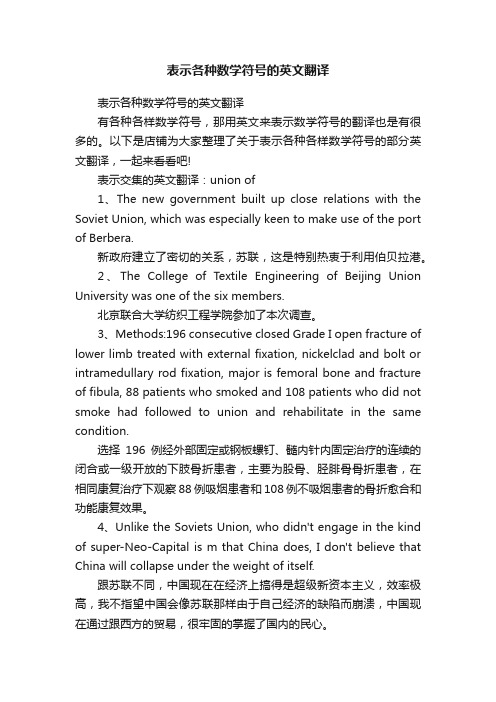
表示各种数学符号的英文翻译表示各种数学符号的英文翻译有各种各样数学符号,那用英文来表示数学符号的翻译也是有很多的。
以下是店铺为大家整理了关于表示各种各样数学符号的部分英文翻译,一起来看看吧!表示交集的英文翻译:union of1、The new government built up close relations with the Soviet Union, which was especially keen to make use of the port of Berbera.新政府建立了密切的关系,苏联,这是特别热衷于利用伯贝拉港。
2、The College of Textile Engineering of Beijing Union University was one of the six members.北京联合大学纺织工程学院参加了本次调查。
3、Methods:196 consecutive closed Grade I open fracture of lower limb treated with external fixation, nickelclad and bolt or intramedullary rod fixation, major is femoral bone and fracture of fibula, 88 patients who smoked and 108 patients who did not smoke had followed to union and rehabilitate in the same condition.选择196例经外部固定或钢板螺钉、髓内针内固定治疗的连续的闭合或一级开放的下肢骨折患者,主要为股骨、胫腓骨骨折患者,在相同康复治疗下观察88例吸烟患者和108例不吸烟患者的骨折愈合和功能康复效果。
4、Unlike the Soviets Union, who didn't engage in the kind of super-Neo-Capital is m that China does, I don't believe that China will collapse under the weight of itself.跟苏联不同,中国现在在经济上搞得是超级新资本主义,效率极高,我不指望中国会像苏联那样由于自己经济的缺陷而崩溃,中国现在通过跟西方的贸易,很牢固的掌握了国内的民心。
100项运动项目英文翻译

93.Keelboat men - Star男子星光级
94.Keelboat women - Yngling女子索林级
95.Shooting射击
96.10 mair rifle10米气步枪
97.10 mair pistol10米气手枪
98.Men\’s10 mrunning target男子10米移动靶
1.Aquatics水上运动
2.Swimming游泳
3.freestyle自由泳
4.backstroke仰泳
5.breaststroke蛙泳
6.butterfly蝶泳
7.individual medley个人混合泳
8.freestyle relay自由泳接力
9.medley relay混合泳接力
10.Water polo水球
83.Rhythmic Gymnastics艺术体操
84.Gymnastics Trampoline蹦床
85.Sailing帆船
86.Windsurfer men / women - Mistral one design男子/女子帆板米氏级
87.Single-handed Dinghy Women - Europe女子帆船欧洲级
11.Diving跳水
12.10mplatform event十米跳台
13.3mspringboard event三米跳板
14.synchronised diving from10 mplatform双人十米跳台
15.synchronised diving from3 mspringboard双人三米跳板
99.Men\’s50 mrifle prone position男子50米步枪卧射
地质专业英文翻译精选4

quadrant 象限quadrate 方骨quadrate bone 方骨quadratic 二次的quadrijugous 四对的quadrupeds 四肢动物quagmire 沼泽qualitative analysis 定性分析qualitative spectral analysis 定性光谱分析quality class 地位级quality of ground water 地下水水质quantitative spectral analysis 定量光谱分析quantometer 光量计quarry 采石场quarrying 露天开采quartation 四分法quartering 四分法quarternary 第四纪quartz 石英quartz andesite 石英安山岩quartz basalt 石英玄武岩quartz crystal 水晶quartz diorite 石英闪长岩quartz diorite line 石英闪长岩线quartz dolerite 石英粗玄岩quartz glass 石英玻璃quartz keratophyre 石英角斑岩quartz porphyry 石英斑岩quartz sand 石英砂quartz schist 石英片岩quartz spectrograph 石英摄谱仪quartz trachyte 石英粗面岩quartz wedge 石英楔quartzine 正玉髓quartzite 石英岩quartzy 石英质的quasi equilibrium 准平衡quasi viscous flow 半粘性流quaternary 第四期quaternary diagram 四元系状态图quaternary geology 第四纪地质学quaternary ice age 第四纪冰期quaternary period 第四纪quaternary research 第四纪学quaternary screw axis 四元螺旋轴quaternary studies 第四纪学quaternary system 第四系quaternary volcanic rocks 第四纪火山岩quenching method 淬火法quenselite 基性锰铅矿quenstedtite 紫铁矾quick clay 过敏性粘土quick lime 生石灰quicksand 脸quiet reach 静河段quinaldinic acid 喹啉酸quinalizarin 醌茜素quinoline carboxylic acid 喹啉酸quisqueite 硫沥青r factor r 因子r tectonite r 构造岩rabbitite 针钙镁铀矿racewinite 变色柱石rachis 叶轴racial character 人种的特征racial characteristics 人种的特征rad 拉德radar 雷达radar observation 雷达观测radar sonde 无线电测风仪radiaion excitation 辐射激发radial 放射状的radial bundle 辐射维管束radial dikes 放射状岩脉群radial fault 放射状断层radial flow 径向流radial rift 放射断裂radial symmetry 径向对称radial vascular bundle 辐射维管束radiant energy 辐射能radiation balance 辐射平衡radiation balance of earth 地球辐射平衡radiation chemical process 辐射化学过程radiation chemical reaction 辐射化学反应radiation chemistry 放射线化学radiation counter 辐射计数管radiation damage 放射线破坏radiation decomposition 辐射分解radiation density 辐射密度radiation detector 辐射探测器radiation dose 辐射剂量radiation effect 辐射作用radiation intensity 辐射强度radiation inversion 辐射逆温radiation length 辐射长度radiation shielding 辐射防护radiative collision 非弹性碰撞radio luminescence 射线发光radio wave method 无线电波法radioactivation analysis 放射化分析radioactive anomaly 放射性异常radioactive balance 放射平衡radioactive chain 放射性衰变链radioactive cobalt 放射性钴radioactive constant 放射常数radioactive contamination 放射性沾染radioactive decay 放射性衰变radioactive decontamination 消除放射性radioactive deposit 放射性沉淀物radioactive element 放射元素radioactive equilibrium 放射平衡radioactive etalon 放射能标准源radioactive fallout 放射性沉降radioactive family 放射系radioactive fission product 放射性裂变产物radioactive half life 放射性物质的半衰期radioactive iron 放射性铁radioactive isotope 放射性同位素radioactive logging 放射能测井radioactive material 放射性物质radioactive mineral 放射矿物radioactive mineral spring 放射性矿泉radioactive prospecting 放射性勘探radioactive radiation 放射性辐射线radioactive rare metal 放射性稀有金属radioactive sample 放射性样品radioactive series 放射系radioactive source 放射源radioactive substance 放射性物质radioactive tracer 放射性示踪radioactive tracer logging 放射性示踪测井radioactive tracer method 放射性示踪剂法radioactive transformation 放射性转化radioactive unit 放射性单位radioactivity 放射性radioactivity logging 放射能测井radioactivity survey 放射性勘探radiobaryte 镭重晶石radiobiologic action 放射性生物作用radiobiology 放射生物学radiocarbon 射碳radiocarbon age 放射性碳年令radiocarbon dating 放射性碳测定年代radiochemical analysis 放射化学分析radiochemistry 放射化学radiochronology 放射年代学radiocobalt 放射性钴radiocolloid 放射性胶质radioelement 放射元素radiogeochemistry 放射地球化学radiogoniometer 无线电测角器radiographic contrast 射线照像对照radiography 射线照相术radiohydrogeology 放射水文地质学radioisotope 放射性同位素radioisotope indicator 放射性指示剂radiolaria 放射虫radiolarian ooze 放射虫软泥radiolarian rock 放射虫岩radiolarian slate 放射虫片岩radiolarite 放射虫岩radiolite 钠沸石radiolitic 放射状的radiology 放射学radiolysis 放射性分解radiometer 放射量计radiometric analysis 放射测量分析radiometric sampling 放射取样法radiometry 辐射测量术radionuclide 放射性核素radiophyllite 水硅灰石radiosonde observation 无线电探空radiotracer 放射性指示剂radiotracer method 放射性示踪剂法radium 镭radium age 镭龄radium emanation 镭射气radium series 镭系radium source 镭源radium spring 镭泉radium standard 镭标准源radius of action 作用半径radius of influence 影响半径radius ratio 半径比radon 氡radon survey 氡气测量rafaelite 斜羟氯铅矿raglanite 奥霞正长岩raimondite 片铁矾rain print 雨痕rain rill 雨沟rain wash 雨剧raindrop impressions 雨痕rainfall depth 雨量rainwater 雨水raise 隆起rake classifier 耙式分级机ralstonite 氟钠镁铝石ramdohrite 辉锑银铅矿rammelsbergite 斜方砷镍矿ramming 捣固ramsayite 褐硅钠钛矿ramsdellite 斜方锰矿rancieite 钙硬锰矿rand 边缘randanite 硅藻土randite 黄菱铀矿random 随机的random distribution 偶然分布random error 随机误差random event 随机事件random sample 随机样品random sampling 随机采样range 射程;山脉;作用距离range finder 测距仪ranging pole 标尺测杆rank 等级ransomite 铜铁矾rapakiwi granite 环斑花岗岩raphe 缝rapid 急流急滩rapid flow 快速迳流rare earth elements 稀土元素rare elements 稀有元素rare gas 稀有气体rare gas elements 惰性气体元素rare metal 稀有金属rarefaction 稀疏作用raspite 斜钨铅矿ratchel 卵石rate 比率rate of crystalline growth 晶体生长速度rate of decay 风化程度rate of drying 干燥速度rate of infiltration 渗透速度rate of penetration 机械钻速rate of production 生产率rate of recovery 回采率rate of runoff 迳潦rate of sedimentation 沉淀速度rate of subsidence 沉陷速度ratemeter 计数率计rathite 斜方砷铅矿rating curve 量特性曲线ratio of ionic radii 离子半径比rational formula 示构式ratofkite 土状萤石rattle stone 钤石rauracian 罗拉克阶rauvite 水钙钒铀矿ravine 沟壑raw coal 原煤raw humus 粗腐殖质raw material 原料raw ore 未选的矿石raw soil 生土raw water 未加工水rayfungi 放线菌类rayleigh distribution 瑞利分布reaction current 逆流reaction principle 反应原理reaction product 反应产物reaction rate 反应速度reaction rim 反应边reaction series 反应系列reactivation 再活化readjustment 校正reagent 试剂real crystal 真实晶体real image 实象realgar 鸡冠石reamer 扩孔器reamer bit 扩孔钻头reaming 扩眼reaming bit 扩眼钻头rearrangement 重新配置recapitulation 再现receiving surface 接收面recent crust horizontal movement 现代地壳水平运动recent exogenetic movement 现代外生运动recent geological period 现代地质时期recent vertical crust movement 现代地壳垂直运动recess 褶皱带内凹部;凹穴recession constant 衰退常数recession curve 递减曲线recessional moraine 后退冰碛recharge 补给recharge line 补给线recharge pit 补给坑recharge water 补给水recharge well 补给井recipient 容器reciprocal lattice 倒易格子reciprocating pump 往复泵recoil electron 反冲电子recombination 再化合reconnaissance 踏勘reconstruction 复原recorder 记录器recorder strip 记录带recording chart 记录纸recording device 记录装置recording drum 记录圆筒recording gage 自动记录测定计recording oscillograph 记录示波器recording paper 记录纸recording tape 记录带recoverable oil reserves 可采石油储量recovery 回收;采取recovery factor 岩心采取率recovery hook 打捞钩recovery ratio 回采率recovery time 恢复时间recrement 矸石recrystallization 重结晶作用recrystallization texture 再结晶织构rectangular wave 矩形波rectilinear scanning 直线扫描rectorite 累托石recumbent anticline 伏背斜recumbent fold 伏卧褶皱recurrence 循环red algae 红藻类red brass 红色黄铜red brown mediterranean soil 地中海褐色土red clay 红土red copper ore 赤铜矿red earth 红壤red iron ore 赤铁矿red iron stone 赤铁矿red mud 红泥red phosphorus 红磷red soil 红壤reddingite 磷锰矿redeposition 再沉积redge 暗礁redingtonite 水铬镁矾redissolving 再溶解redox equilibrium 氧化还原平衡redox potential 氧化还原势redox process 氧化还原过程redox system 氧化还原系reduced cell 简化格子reduced pressure 折算压力reducer 还原剂reducing capacity 还原能力reducing joint 异径连接reduction 减少reduction division 减数分裂reduction of gravity 重力归算reduzate 还原沉积物reef 礁reef bin 矿仓reef building corals 造礁珊瑚reef cap 礁帽reemission 重发射reference data 参考资料reference ellipsoid 参考椭球体reference point 基准点reference pressure 基准压力reference spheroid 参考椭球体reference table 换算表reference temperature 基准温度refined oil 精制油refinement 精制refining 精制reflectance 反射比reflected light 反射光reflected wave 反射波reflecting galvanometer 反射电疗reflecting microscope 反射显微镜reflection 反射reflection anisotrophism 反射蛤异性reflection coefficient 反射系数reflection electron microscope 反射电子显微镜reflection factor 反射系数reflection method 反射法reflection of light 光反射reflection pleochroism 反射多色性reflection seismograph 反射地震仪reflection survey 反射波法勘查reflective power 反射能力reflectivity 反射比reflectometer 反射计reflector 反射镜refracted wave 折射波refracting medium 折射介质refraction 折射refraction correlation method 折射波对比法refraction method 折射法refraction of cleavage 劈理折射refraction survey 折射波法勘探refractive index 折射率refractivity 折射性refractometer 折光计refractoriness 耐火度refractory 耐火材料refractory brick 耐火砖refractory clay 耐火粘土refractory material 耐火材料refractory sand 耐火砂refrigeration 冷却refuse 废料refusion 再溶regelation 重凝regenerated deposit 再生矿床regenerated glacier 再生冰川regeneration 再生regeneration theory 再生学说regenerative amplification 再生放大regime of river 河灵况region 地域regional 地方的regional geochemistry 区域地球化学regional geological reconnaissance 区域地质甸regional geology 区域地质学regional geomorphology 区域地貌学regional gravity anomaly 区域重力异常regional isostatic anomaly 区域均衡异常regional metamorphism 区域变质regional remote sensing 区域遥感regional unconformity 区域不整合registration 记录registration paper 记录纸regma 破裂regolith 表皮土regression 海退regression analysis 回归分析regression line 海退线regressive metamorphism 退化变质regressive sequence 海退层序regular hexahedron 正六面体regular polygon 正多边形regular polyhedron 正多面体regular reflection 规则反射regular system 等轴晶系regulation reservoir 蝶蓄水池regur 黑棉土reinerite 砷锌矿reinite 方钨铁矿rejects 尾矿rejuvenated geosyncline 新生式地槽rejuvenated landform 地形侵蚀回春rejuvenated relief 地形侵蚀回春rejuvenated river 回春河rejuvenated water 再生水rejuvenation 回春作用relationship 关系relative age 相对时代relative aperture 相对孔径relative biological effectiveness 相对生物效率relative height 相对高度relative humidity of atomsphere 大气相对湿度relative isotopic abundance 同位素相对丰度relative permeability 相对渗透性relative relief 地势起伏量relative valency effect 相对原子价效果relative viscosity 相对粘度relaxation 松弛relaxation effect 张弛效应relaxation time 松弛时间relay 继电器relay interrupter 继电平断续器release 释放release joint 解压节理release magnet 释放电磁铁relic 残余relic area 残遗分布区relic mineral 残余矿物relic soil 残遗土壤relic species 残遗种relic structure 残余构造relict 残余物relief 地势relief energy 地势起伏量relief intensity 地势起伏强度relief inversion 地形转换relief map 起伏量图relief ratio 硫高宽比relief volume 起伏量reluctance 磁阻remanence 剩余磁性remanent magnetization 剩磁remining 再次开采remnant arc 古岛弧remobilization 再活化remolding 破碎remote control 遥控remote hybrid 远缘杂种remote sensing 遥感remote sensing application 遥感应用remote sensing technology 遥感技术removal 消去renardite 多水磷铅铀矿rendzina 黑色石灰土renewed fault 复活断层reniform 肾状的reniform structure 肾状构造rensselaerite 假晶滑石rent 裂口repair part 备件repeller 反射极reperforator 复凿孔机replacement 交代replenishment 补充replica 复制replica method 复型法reprecipitation 二次沉下representative species 典型种reproducer 复制穿孔机reproducibility 再现性reptiles 爬虫类rescue borehole 救护钻孔research 甸resedimentation 再沉积resequent river 再顺河reserves 矿石埋臧量reservoir 贮水池reservoir evaporation 储水蒸发reservoir lake 储水湖reservoir rock 储油岩石reservoir structure 储热构造reshuffle 重新配置residual affinity 残留亲和力residual anomaly 剩余异常residual bouguer anomaly 布格剩余异常residual clay 残余粘土residual deposit 残留矿床residual drawdown 残余水位下降residual electric charge 剩余电荷residual geosyncline 残余地槽residual gravity 剩余重力residual gravity anomaly 剩余重力异常residual heat 残热residual magma 残余岩浆residual magnetism 剩余磁性residual mass 剩余质量residual mobility period 余动期residual mountain 残余山residual sediment 残余沉积物residual soil 残余土壤residual stability period 余定期residual standard deviation 剩余标准差residual stress in rocks 岩石残余应力residual valence 剩余价residuary water 废水residuum 残留物resilience 弹性resin 尸resinite 尸体resinitic liptobiolite 尸残殖煤resinous lustre 尸光泽resistance thermometer 电阻温度计resistant rock 稳固岩石resistate 残留产物resistivity 电阻率resistivity logging 电阻率测井resistivity survey 电阻率甸resolution 分解能力resolver 解算器分解器resolving power 分解能力resonance absorption of neutron 中子共振吸收resonance energy level 共振能级resonance of chemical bonds 化学键间的共振resources 资源resources remote sensing 资源遥感response time 响应时间restite 残余体restoration 复原restriction arc 限制弧resultant 合量resurgent water 复活水retained water 薄膜水retardation 减速;行路差retarded creep 延迟蠕变retarded potential 推迟电势retarding electrode 制动电极retarding field 减速场retarding torque 制动转矩retention of water 水分保持retgersite 镍矾reticle 十字线reticular cell 网状细胞reticular structure 网状构造reticulate venation 网状脉reticulated mottle 网状斑点reticulated veine 网状脉reticulation 网状reticulum cell 网状细胞retinite 尸石retort 蒸馏器retort carbon 甑碳retreat 后退retreatment cell 再选浮选机retroaction 反作用retrogradation 海蚀后退retrograde metamorphism 退化变质retrogressive accumulation 向源堆积retrogressive metamorphism 退化变质retrogressive succession 逆行演替return flow 回流revdinskite 镍铁绿泥石reverberation 混响reverberatory furnace 反射炉reversal 倒转reversal of geomagnetic field 地磁场倒转reversal of magnetization 磁化逆转reversal of the earth's field 地磁极逆转reverse circulation 反循环reverse circulation flushing 反循环冲洗reverse fault 逆断层reverse feedback 负回授reverse grading 逆粒级reverse mutation 回复突变reverse position 倒转层位reverse rotary boring 反向旋转钻井reverse thermoremanent magnetization 反向热剩余磁化reverse zoning 逆带现象reversed fault 逆冲断层reversed fold 倒转褶皱reversed river 反向河reversibility 可逆性reversible cell 可逆电池reversible chemical reaction 可逆化学反应reversible colloid 可逆胶体reversible magnetization 可逆磁化reversible motor 可逆电动机reversible pendulum 可倒摆reversing thermometer 回动温度计reversion 返祖revived fault 复活断层revived structure 再生结构revolution 变革revoredite 硫砷铅石reyerite 铝白钙沸石rezbanyite 铜辉铅铋矿rhabdolith 棒状晶体rhabdophanite 磷铈钇矿rhaegmageny 断裂运动rhaetian 瑞提阶rhaetic stage 瑞提阶rhagite 砷酸铋矿rhegmagenesis 断裂运动rheidity 流变rhenium 铼rhenium osmium dating 铼锇法测年rheological behavior 龄性行为rheology 龄学rheomorphism 龄rhizoid 假根rhizome 根茎rhizopodium 根足rhizosphere 根圈rhodesite 纤硅碱钙石rhodite 铑金矿rhodium 铑rhodizite 硼锂铍矿rhodochrome 暗绿石rhodochrosite 菱锰岩rhodonite 蔷薇辉石rhoenite 褐斜闪石rhombenporphyry 菱长斑岩rhombic 斜方的rhombic dipyramidal class 斜方双锥体类rhombic dodecahedron 斜方十二面体rhombic hemimorphic hemihedral class 菱形异极半面象晶族rhombic prism 斜方柱rhombic pyramid 斜方锥rhombic system 斜方晶系rhombic tetrahedral class 斜方四面体类rhombohedral class 菱面体类rhombohedral hemimorphic hemihedral class 菱形极半面象晶族rhombohedral system 菱形晶系rhombohedral tetrahedry 斜方正多面像rhombohedral tetratohedral class 菱形四分面体类rhombohedron 菱形六面体rhyodacite 疗英安岩rhyolite 疗岩rhythm 韵律ria 溺河rias coast 里亚斯式海岸ribonucleic acid 核糖核酸rich ore 富矿richetite 板铅铀矿richmondite 四水磷铝石richterite 锰闪石rickardite 铜碲矿riddle 粗筛ridge 海岭riebeckite 钠闪石riedenite 方黑云霓辉岩riemannite 水铝英石rift 裂谷rift belt 裂谷带rift valley 中央裂谷rift zone 裂谷带rig 钻探设备right angle 直角right bank 右岸right handed crystal 右晶rigid body 刚体rigid dynamics 刚体动力学rigidity 刚性rill 小溪rill erosion 细沟侵蚀rill marks 鳞rille 月面谷rim 岬rime 雾淞rind 外皮ring compound 环状化合物ring counter 环形计数器ring dike 环状岩墙ring fault 环状断层ring like ore body 环状矿体ring ore 环状矿石ring silicate 环状硅酸盐ring structure 环状构造rinkite 层硅铈钛矿rinkolite 绿层硅铈钛矿rinneite 钾铁盐ripidolite 铁绿泥石ripple 脉动ripple current 波纹电流ripple marks 波痕ripple noises 电源交岭声ripples 皱纹rise 海隆rish 急冲rising velocity 上升速度risorite 钛褐钇铌矿riss glacial stage 里斯冰期rivage 河岸river 河river bank 河岸river basin 硫river bed 河床river bed placer 河床砂矿river bend 河曲river bottom 河底river capture 河霖夺river erosion 河林蚀river gravel 河砾石river mouth 河口river profile 河凛剖面river profile of equilibrium 河两衡剖面river swamp 河沼泽river system 河系river terrace 河成阶地river width 河幅riverside 河岸riverside soil 泛滥地土壤rivotite 里播岩rivulet 小河rizzonite 玻基辉橄岩road 巷道roadway support 巷道支架roast ore 焙烧矿石rock 岩石rock breaking 岩石破坏rock breaking tool 碎石工具rock burst 岩石突出rock cementation 岩石胶结作用rock creep 岩石蠕动rock crusher 碎石机rock crystal 水晶rock desert 石质沙漠rock drillability 岩石的可钻性rock dust 岩石尘土rock facies 岩相rock fields 岩海rock formation 岩系rock forming element 造岩元素rock forming minerals 造岩矿物rock gas 天然气rock grouting 岩石胶结作用rock hardness 岩硬rock hardness ratio 岩石硬度比rock magnetism 岩石磁性rock mass 岩石层;岩块rock meal 岩粉rock mechanics 岩石力学rock movement 岩层移动rock pillar 岩柱rock pressure 岩石压力rock salt 岩盐rock strata 岩层rock stream 石流rock system 岩石系统rock terrace 岩石阶地rock texture 岩石结构rock toughness 岩石的粘性rock vegetation 石生植被rock wall 石墙rock weathering 岩石风化rock's abrasivity 岩石的研磨性rockallite 钠辉细岗岩rockbasin 岩盆rocket sounding 火箭探空rockfacies 岩相rockfall 岩崩rockfill 填石rockslide 岩滑rocky 多岩石的rocky coast 岩石海岸rod 钻杆rod boring 钻杆钻进rod holder 钻杆夹钎器rod mill 棒磨机rodding structure 杆状构造rodingite 异剥钙榴辉长岩rodless drilling 无钻杆钻进roeblingite 铅蓝方石roemerite 粒铁矾roentgen 伦琴roentgen equivalent 伦琴当量roentgen equivalent man 雷姆roentgen rays x 射线roepperite 锌锰橄集rogersite 六水铁矾roll crusher 辊式破碎机roller bit 牙轮钻头rolling 滚romanechite 钡硬锰矿romanzovite 钙铝榴石romeite 锑钙石ron magnesium metasomatism 铁镁交代作用roof 顶板roof bolting 顶板锚栓支架roof of coal seam 煤层顶板roof rock 顶盖岩roof timbering 顶板支架roofing slate 盖板岩room 室rooseveltite 砷铋矿root nodule 根瘤root zone 根带rootless fumarole 无根喷气孔rope boring 绳私打钻rope socket 绳帽ropy lava 波纹熔岩rosasite 斜方绿铜锌矿roscoelite 钒云母rose diagram 玫瑰图rose quartz 蔷薇石英rosenbuschite 橙针钠钙石rosieresite 磷铝铅铜矿ross 岬rossite 水钒钙石rotary bit 旋转式钻头rotary boring 回转钻探rotary drill 旋转钻机rotary drilling machine 旋转钻机rotary filter 旋转滤器rotary percussive drilling 回转冲魂进rotary polarization of petroleum 石油旋光性rotary system of drilling 回转钻井方法rotary table 转盘rotating crystal method 旋转晶体法rotating meter 旋转临计rotating table 转盘rotation tectonite r 构造岩rotation twin 旋转双晶rotational deformation 旋转变形rotational fault 旋转断层rotational grain 旋转晶粒rotational speed 转速rotatory fault 旋转断层rotten spot 锅穴rougemontite 橄钛辉长岩rougher flotation 粗选roughing 粗选roughness 粗糙度roughness coefficient 粗糙度系数round trip 回次round worms 线形动物类roundness 圆度roundstone 圆石route 航线routivarite 褶英二长岩rouvillite 淡霞斜岩row 煤层roweit 基性硼锰钙石rowlandite 硅氟铁钇矿royalty 矿藏开采权rubbish 碎屑;废石rubbish dump 碎石堆rubble 碎石rubellite 红电气石rubicelle 橙尖晶石rubidium 铷rubidium strontium dating 铷锶测年rubidium strontium method 铷锶测年法rubrozem 腐殖质红色土ruby 红宝石rudaceous 砾状的rudimentary organ 退化瀑rudimentogeosyncline 雏地槽rudyte 砾质岩rugged 凹凸不平的ruin 毁灭rules of nomenclature 命名法规rumpfite 淡斜绿泥石run 走向run of bank gravel 采石坑砾石run of mine coal 原煤run of mine ore 原矿run off 瘤running sand 松砂running water level 廉位runoff coefficient 经恋数rupelian 鲁培勒阶rupture 破裂rupture stress 破裂应力ruptured zone 碎裂带russellite 钨铋矿rust coloured forest soil 潜育灰化土ruthenium 钌rutherfordine 纤碳铀矿rutile 金红石。
二十四节气英文翻译
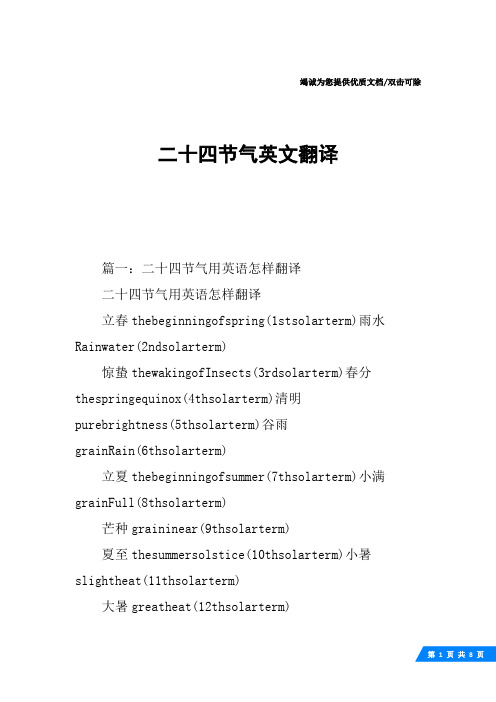
竭诚为您提供优质文档/双击可除二十四节气英文翻译篇一:二十四节气用英语怎样翻译二十四节气用英语怎样翻译立春thebeginningofspring(1stsolarterm)雨水Rainwater(2ndsolarterm)惊蛰thewakingofInsects(3rdsolarterm)春分thespringequinox(4thsolarterm)清明purebrightness(5thsolarterm)谷雨grainRain(6thsolarterm)立夏thebeginningofsummer(7thsolarterm)小满grainFull(8thsolarterm)芒种graininear(9thsolarterm)夏至thesummersolstice(10thsolarterm)小暑slightheat(11thsolarterm)大暑greatheat(12thsolarterm)立秋thebeginningofAutumn(13thsolarterm)处暑theLimitofheat(14thsolarterm)白露whiteDew(15thsolarterm)秋分theAutumnalequinox(16thsolarterm)寒露coldDew(17thsolarterm)霜降Frost′sdescent(18thsolarterm)立冬thebeginningofwinter(19thsolarterm)小雪slightsnow(20thsolarterm)大雪greatsnow(21stsolarterm)冬至thewintersolstice(22ndsolarterm)小寒slightcold(23rdsolarterm)大寒greatcold(24thsolarterm)篇二:二十四节气中英文对照二十四节气中英文对照二十四节气是中国古代订立的一种用来指导农事的补充历法,是中国古代汉族劳动人民长期经验的积累和智慧的结晶。
新标准大学英语第二版综合教程4课后翻译
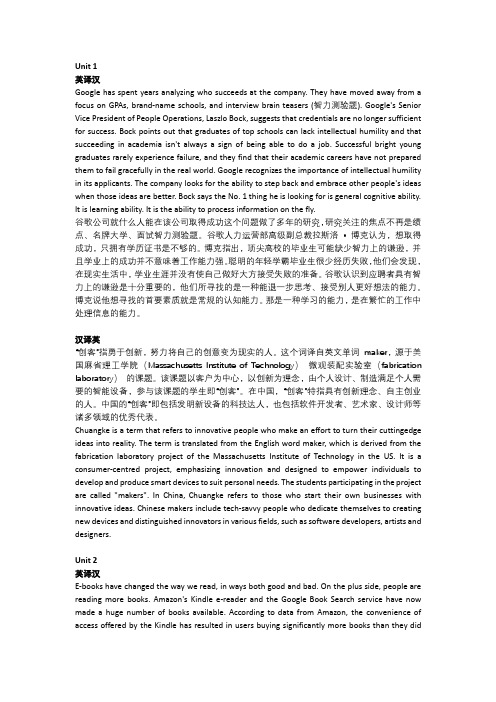
Unit 1英译汉Google has spent years analyzing who succeeds at the company. They have moved away from a focus on GPAs, brand-name schools, and interview brain teasers (智力测验题). Google's Senior Vice President of People Operations, Laszlo Bock, suggests that credentials are no longer sufficient for success. Bock points out that graduates of top schools can lack intellectual humility and that succeeding in academia isn't always a sign of being able to do a job. Successful bright young graduates rarely experience failure, and they find that their academic careers have not prepared them to fail gracefully in the real world. Google recognizes the importance of intellectual humility in its applicants. The company looks for the ability to step back and embrace other people's ideas when those ideas are better. Bock says the No. 1 thing he is looking for is general cognitive ability. It is learning ability. It is the ability to process information on the fly.谷歌公司就什么人能在该公司取得成功这个问题做了多年的研究,研究关注的焦点不再是绩点、名牌大学、面试智力测验题。
人教版PEP英语五年级(上)Unit 4翻译知识点+练习

人教版PEP英语五年级(上)Unit 4(翻译、单元知识点、同步练习)课文翻译Unit 4 What can you do? 你能做什么?We'll have an English party next Tuesday. 我们下周二要开英语派对。
Great. 太好了。
What can you do for the party? 你能为派对做什么?I can play the pipa. 我会弹琵琶。
Wonderful! 太好了!I can dance. 我会跳舞。
I can sing. La la la.. 我会唱歌。
啦啦啦……Hi, Mr Li. 你好,李先生。
Hi. Can you play ping-ping? 你好。
你会打乒乓球吗?A little. 一点。
Let's play together! 一起玩吧!Sorry. I have an English class at 3 o'clock. 对不起。
我下午三点有一节英语课。
Unit 4 A Let's try 一起试试What can Mike do? 迈克能做什么?Listen and tick. 听并打勾。
Hi, Mike. We'll have an English party next Tuesday. 你好,迈克。
我们下周二有英语派对。
Great. I like parties. 太好了。
我喜欢派对。
What can you do for the party? 你能为派对做什么?I can draw pictures. 我能画画。
It's time for English class. Get ready! 该上英语课了。
准备好!Unit 4 A Let's talk 一起说吧Miss White: We'll have an Enlish party next Tuesday! 我们下周二有英语派对。
新目标八年级上册英语Unit4能力提升训练及答案

新目标八年级上册英语Unit4能力提升训练及答案Part1完形填空When you were one year old, she fed you. You thanked her 1 crying (哭) all night long. When you were three, she 2 all the meals with love. You thanked her by throwing(扔) your 3 onto the floor. When you were five, she 4 you for the parties. You thanked her by making the new clothes dirty. When you were seven, she bought you a baseball. You thanked her by 5 the neighbor’s window with it. When you were nine, she 6 piano lessons for you. You thanked her by 7 practicing. When you were eleven, she took you and your friends to the movies. You thanked her by asking her to sit in a 8 row (排).Who is she? She is your 9 . Always remember to love your mother. No love is 10than mother’s love. And you only have one mother in your lifetime!( )1. A. on B. of C. by D. in( )2. A. made B. ate C. sold D. took( )3. A. bowl B. book C. ticket D. phone( )4. A. wore B. waited C. asked D. dressed( )5. A. playing B. cleaning C. breaking D. touching( )6. A. cared about B. paid for C. brought out D. learned from( )7. A. always B. usually C. sometimes D. hardly( )8. A. different B. top C. long D. quiet( )9. A. teacher B. friend C. sister D. mother( )10. A. worse B. greater C. further D. easierPart2Hi, I’m Larry. Simon and I are brothers. At the moment Simon and I are standing in the room 1 . And we’re saying nothing and doing nothing. We’re just looking at ourselves in the mirror. We are 2 twelve years old. Simon and I are twins (双胞胎). Our birthdays are on the 3 date—February 28th. 4 we are twins, Simon is not similar to me in some ways. He is a little 5 . He has two small eyes. I’m thin with two big eyes. I’m a serious boy. I 6 tell jokes (笑话). I have 7 friends at school, so I often feel lonely. Simon is more outgoing than me and good 8 telling jokes. He can meet his 9 everywhere at school. And Simon thinks that it is very important for 10 to make a lot of friends. ( )1. A. quietly B. almost C. loudly D. cheaply( )2. A. every B. each C. all D. both( )3. A. healthy B. old C. different D. same( )4. A. Although B. If C. Because D. And( )5. A. free B. difficult C. heavy D. hungry( )6. A. usually B. never C. always D. often( )7. A. little B. few C. many D. much( )8. A. at B. for C. in D. from( )9. A. doctors B. sisters C. teachers D. friends( )10. A. it B. him C. her D. themPart3阅读理解AEvery school has notice boards (公告板). Let’s see what is on the notice board of thisschool.Class Announcement(通知)Testing dates:The English test: June 14The physics test: June 15The Chinese test: June 16Parent meeting:The next parent meeting is at 6 pm on Friday, June 21 in the meeting hall.After-school programYou can still stay at school from 3:30 pm to 6:00 pm every weekday.3:30~4:30 Homework4:30~5:00 Reading5:00~6:00 ActivitiesIf you have any questions, you can call at 6689-7459 for more information.根据表格内容,选择最佳答案。
新标准大学英语4课后翻译
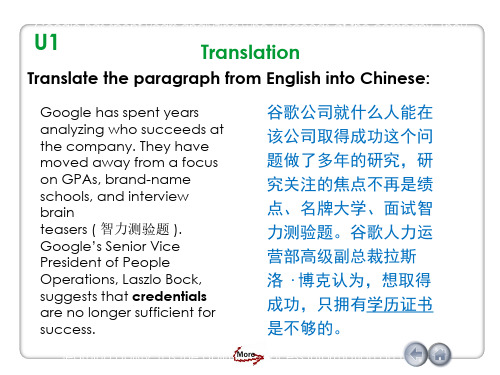
Operations, Laszlo Bock,
for 洛 ·博克认为,想取得
tsahueregagnbeoilsittlyostntohgasetetrpcsurbefafdiccekienatninatdlfsoermidberaacsea成oreth功er,pe只op拥le’有s id学ea历s w证he书n those sbuectcteers. sB.ock says the No. 1 thing he is是loo不ki够ng的for。is general cognitive
Back
U1
(1)“创客”指勇于创新,努力将自己的创意 变为现实的人。
“ Chuangke” refers to people who dare to innovate (make innovations) and strive to turn their creativity into reality.
U1 moved away from a focus oTnraGPnAhsas,lvabertainodn-name schools, and interview
tTeraasnerssl(a智te力t测h验e题pa). rGaogorgalep’shSefrnobiormar ViniEcnegPrleisshideinnttoof CPehoipnleeOsep:erations,
BGocoko, sguleggheastssstphaetnct ryeedaernstials arLeanszolo谷lon歌ge公r su司ffic就ie什nt f么or 人suc能ce在ss. Bock analyzing who succeeds at points该公司取得成功这个问
人教版英语八年级上册Unit4 What’s the best movie theater

初中英语学习材料madeofjingetiejiUnit4 What’s the best movie theater?Part 1 TextbookWho’s Got Talent?(每个人都有自己擅长的事情,但是有的人确实很有天赋). it's always interesting (看其他人展示才能).Talent shows (正越来越受欢迎). First, there were shows like American Id ol and American’s Got Talent. Now there are similar shows around the world, such as China’s Got Talent.All these shows (有一些共同之处): They try to look for the best singers, the most talented dancers, the most exciting magicians, the funniest actors and so on. All kinds of people join these shows, (但是谁的钢琴弹得最好或者唱的最好?由你而定). When people watch the show, (他们通常在决定谁是胜利者上起作用), and the singer always get a very good prize.However, not everybody enjoys watching this show. Some think that (现场的表演者是故意装的). For example, some people say they are poor farmers, but in fact They are just actors. However, (如果你不把这些节目看得太严肃), they are fun to watch. And one great thing about them is that they give people (一种让梦想成真的方式).Part 2 Words and Phrases一、把下面的短语翻译成英文1. 最好的电影院2. 离……近3. 非快地买票4. 最短的等待时间5. 最乏味的歌曲6. 新来镇上7. 相当差劲8. 考虑,想到9. 展示某人的才艺10. 越来越受欢迎11. 全世界12. 有一件相同的事情13. 努力做某事14. 寻找15. 唱得最漂亮16. 由你决定做……17. 在……之中起重要作用/ 扮演重要角色18. 得到很好的奖励19. 例如20. 事实上21. 周末的最好去处22. 接朋友/和朋友见面23. 街道表演者24. 你可以玩得高兴的地方25. 最小的咖啡店之一26. 花5元买一大盘饺子27. 散步28. 长长的等待时间29. 别着急30. 位于城市的中心地带31. 一个优秀的钢琴演奏者32. 最具创意的表演33. 倒立着弹吉它34. 不断地掉球35. 谢谢你告诉我。
- 1、下载文档前请自行甄别文档内容的完整性,平台不提供额外的编辑、内容补充、找答案等附加服务。
- 2、"仅部分预览"的文档,不可在线预览部分如存在完整性等问题,可反馈申请退款(可完整预览的文档不适用该条件!)。
- 3、如文档侵犯您的权益,请联系客服反馈,我们会尽快为您处理(人工客服工作时间:9:00-18:30)。
无锡职业技术学院毕业设计说明书(英文翻译)英文Programmable controller designed for electro-pneumatic systems This project deals with the study of electro-pneumatic systems and the programmable controller that provides an effective and easy way to control the sequence of the pneumatic actuators movement and the states of pneumatic system. The project of a specific controller for pneumatic applications join the study of automation design and the control processing of pneumatic systems with the electronic design based on microcontrollers to implement the resources of the controller.1. IntroductionThe automation systems that use electro-pneumatic technology are formed mainly by three kinds of elements: actuators or motors, sensors or buttons and control elements like valves. Nowadays, most of the control elements used to execute the logic of the system were substituted by the Programmable Logic Controller (PLC). Sensors and switches are plugged as inputs and the direct control valves for the actuators are plugged as outputs. An internal program executes all the logic necessary to the sequence of the movements, simulates other components like counter, timer and control the status of the system.With the use of the PLC, the project wins agility, because it is possible to create and simulate the system as many times as needed. Therefore, time can be saved, risk of mistakes reduced and complexity can be increased using the same elements.A conventional PLC, that is possible to find on the market from many companies, offers many resources to control not only pneumatic systems, but all kinds of system that uses electrical components. The PLC can be very versatile and robust to be applied in many kinds of application in the industry or even security system and automation of buildings.Because of those characteristics, in some applications the PLC offers to much resources that are not even used to control the system, electro-pneumatic system is one of this kind of application. The use of PLC, especially for small size systems, can be very expensive for the automation project.An alternative in this case is to create a specific controller that can offer the exactly size and resources that the project needs [3, 4]. This can be made using microcontrollers as the base of this controller.The controller, based on microcontroller, can be very specific and adapted to only one kind of machine or it can work as a generic controller that can be programmed as a usual PLC and work with logic that can be changed. All these characteristics depend on what is needed and how much experience the designer has with developing an electronic circuit and firmware for microcontroller. But the main advantage of design the controller with the microcontroller is that the designer has the total knowledge of his controller, which makes it possible to control the size of the controller, change the complexity and the application of it. It means that the project gets more independence from other companies, but at the same time the responsibility of the control of the system stays at the designer hands2. Electro-pneumatic systemOn automation system one can find three basic components mentioned before, plus a logic circuit that controls the system. An adequate technique is needed to project the logic circuit and integrate all the necessary components to execute the sequence of movements properly.For a simple direct sequence of movement an intuitive method can be used [1, 5], but for indirect or more complex sequences the intuition can generate a very complicated circuit and signal mistakes. It is necessary to use another method that can save time of the project, make a clean circuit, can eliminate occasional signal overlapping and redundant circuits. The presented method is called step-by-step or algorithmic [1, 5], it is valid for pneumatic andelectro-pneumatic systems and it was used as a base in this work.The method consists of designing the systems based on standard circuits made for each change on the state of the actuators, these changes are called steps.The first part is to design those kinds of standard circuits for each step, the next task is to link the standard circuits and the last part is to connect the control elements that receive signals from sensors, switches and the previous movements, and give the air or electricity to the supply lines of each step. In Figs. 1 and 2 the standard circuits are drawn for pneumatic and electro-pneumatic system [8]. It is possible to see the relations with the previous and the next steps.3. The method applied inside the controllerThe result of the method presented before is a sequence of movements of the actuator that is well defined by steps. It means that each change on the position of the actuators is a new state of the system and the transition between states is called step.The standard circuit described before helps the designer to define the states of the systems and to define the condition to each change between the states. In the end of the design, the system is defined by a sequence that never chances and states that have the inputs and the outputs well defined. The inputs are the condition for the transition and the outputs are the result of the transition.All the configuration of those steps stays inside of the microcontroller and is executed the same way it was designed. The sequences of strings are programmed inside the controller with 5 bytes; each string has the configuration of one step of the process. There are two bytes for the inputs, one byte for the outputs and two more for the other configurations and auxiliary functions of the step. After programming, this sequence of strings is saved inside of a non-volatile memory of the microcontroller, so they can be read and executed.The controller task is not to work in the same way as a conventional PLC, but the purpose of it is to be an example of a versatile controller that is design for an specific area. A conventional PLC process the control of the system using a cycle where it makes an image of the inputs, execute all the conditions defined by the configuration programmed inside, and then update the state of the outputs. This controller works in a different way, where it read the configuration of the step, wait the condition of inputs to be satisfied, then update the state or the outputs and after that jump to the next step and start the process again.It can generate some limitations, as the fact that this controller cannot execute, inside the program, movements that must be repeated for some time, but this problem can be solved with some external logic components. Another limitation is that the controller cannot be applied on systems that have no sequence. These limitations are a characteristic of the system that must be analyzed for each application.4. Characteristics of the controllerThe controller is based on the MICROCHIP microcontroller PIC16F877 [6,7] with 40 pins, and it has all the resources needed for this project .It has enough pins for all the components, serial communication implemented in circuit, EEPROM memory to save all the configuration of the system and the sequence of steps. For the execution of the main program, it offers complete resources as timers and interruptions.The list of resources of the controller was created to explore all the capacity of the microcontroller to make it as complete as possible. During the step, the program chooses how to use the resources reading the configuration string of the step. This string has two bytes for digital inputs, one used as a mask and the other one used as a value expected. One byte is used to configure the outputs value. One bytes more is used for the internal timer , the analog input or time-out. The EEPROM memory inside is 256 bytes length that is enough to save the string of the steps, with this characteristic it is possible to save between 48 steps (Table 1).The controller (Fig.3) has also a display and some buttons that are used with an interactive menu to program the sequence of steps and other configurations.4.1. Interaction componentsFor the real application the controller must have some elements to interact with the final user and to offer a complete monitoring of the system resources that are available to the designer while creating the logic control of the pneumatic system (Fig.3):•Interactive mode of work; function available on the m ain program for didactic purposes, the user gives the signal to execute the step.•LCD display, which shows the status of the system, values of inputs, outputs, timer and statistics of the sequence execution.•Beep to give important alerts, stop, start and emergency.• Leds to show power on and others to show the state of inputs and outputs.4.2. SecurityTo make the final application works property, a correct configuration to execute the steps in the right way is needed, but more then that it must offer solutions in case of bad functioning or problems in the execution of the sequence. The controller offers the possibility to configure two internal virtual circuits that work in parallel to the principal. These two circuits can be used as emergency or reset buttons and can return the system to a certain state at any time [2]. There are two inputs that work with interruption to get an immediate access to these functions. It is possible to configure the position, the buttons and the value of time-out of the system.4.3. User interfaceThe sequence of strings can be programmed using the interface elements of the controller.A Computer interface can also be used to generate the user program easily. With a good documentation the final user can use the interface to configure the strings of bytes that define the steps of the sequence. But it is possible to create a program with visual resources that works as a translator to the user, it changes his work to the values that the controller understands.To implement the communication between the computer interface and the controller a simple protocol with check sum and number of bytes is the minimum requirements to guarantee the integrity of the data.4.4. FirmwareThe main loop works by reading the strings of the steps from the EEPROM memory that has all the information about the steps.In each step, the status of the system is saved on the memory and it is shown on the display too. Depending of the user configuration, it can use the interruption to work with the emergency circuit or time-out to keep the system safety. In Fig.4,a block diagram of micro controller main program is presented.5. Example of electro-pneumatic systemThe system is not a representation of a specific machine, but it is made with some common movements and components found in a real one. The system is composed of four actuators. The actuators A, B and C are double acting and D-single acting. Actuator A advances and stays in specified position till the end of the cycle, it could work fixing an object to the next action for example (Fig. 5) , it is the first step. When A reaches the end position, actuator C starts his work together with B, making as many cycles as possible during the advancing of B. It depends on how fast actuator B is advancing; the speed is regulated by a flowing control valve. It was the second step. B and C are examples of actuators working together, while B pushes an object slowly, C repeats its work for some time.When B reaches the final position, C stops immediately its cycle and comes back to the initial position. The actuator D is a single acting one with spring return and works together with the back of C, it is the third step. D works making very fast forward and backward movement, just one time. Its backward movement is the fourth step. D could be a tool to make a hole on the object.When D reaches the initial position, A and B return too, it is the fifth step.Fig. 6 shows the first part of the designing process where all the movements of each step should be defined [2]. (A+) means that the actuator A m oves to the advanced position and (A−) to the initial position. The movements that happen at the same time are joined together in the same step. The system has five steps.These two representations of the system (Figs. 5 and 6) together are enough to describe correctly all the sequence. With them is possible to design the whole control circuit with the necessary logic components. But till this time, it is not a complete system, because it is missing some auxiliary elements that are not included in this draws because they work in parallel with the main sequence.These auxiliary elements give more function to the circuit and are very important to the final application; the most important of them is the parallel circuit linked with all the others steps. That circuit should be able to stop the sequence at any time and change the state of the actuators to a specific position. This kind of circuit can be used as a reset or emergency buttons.The next Figs. 7 and 8 show the result of using the method without the controller. These pictures are the electric diagram of the control circuit of the example, including sensors, buttons and the coils of the electrical valves.The auxiliary elements are included, like the automatic/manual switcher that permit a continuous work and the two start buttons that make the operator of a machine use their two hands to start the process, reducing the risk of accidents.6. Changing the example to a user programIn the previous chapter, the electro-pneumatic circuits were presented, used to begin the study of the requires to control a system that work with steps and must offer all the functional elements to be used in a real application. But, as explained above, using a PLC or this specific controller, the control becomes easier and the complexity can be increase also.Table 2 shows a resume of the elements that are necessary to control the presented example.With the time diagram, the step sequence and the elements of the system described in Table 2 and Figs. 5 and 6 it is possible to create the configuration of the steps that can be sent to the controller (Tables 3 and 4).While using a conventional PLC, the user should pay attention to the logic of the circuit when drawing the electric diagram on the interface (Figs. 7 and 8), using the programmable controller, described in this work, the user must know only the concept o f the method and program only the configuration of each step.It means that, with a conventional PLC, the user must draw the relation between the lines and the draw makes it hard to differentiate the steps of the sequence. Normally, one needs to execute a simulation on the interface to find mistakes on the logicThe new programming allows that the configuration of the steps be separated, like described by the method. The sequence is defined by itself and the steps are described only by the inputs and outputs for each step.The structure of the configuration follows the order:1-byte: features of the step;2-byte: mask for the inputs;3-byte: value expected on the inputs;4-byte: value for the outputs;5-byte: value for the extra function.Table 5 shows how the user program is saved inside the controller, this is the program that describes the control of the example shown before.The sequence can be defined by 25 bytes. These bytes can be divided in five strings with 5 bytes each that define each step of the sequence (Figs. 9 and 10).7. ConclusionThe controller developed for this work (Fig. 11) shows that it is possible to create a very useful programmable controller based on microcontroller. External memories or external timers were not used in case to explore the resources that the microcontroller offers inside. Outside the microcontroller, there are only components to implement the outputs, inputs, analog input, display for the interface and the serial communication.Using only the internal memory, it is possible to control a pneumatic system that has a sequence with 48 steps if all the resources for all steps are used, but it is possible to reach sixty steps in the case of a simpler system.The programming of the controller does not use PLC languages, but a configuration that is simple and intuitive. With electro-pneumatic system, the programming follows the same technique that was used before to design the system, but here the designer work s directly with the states or steps of the system.With a very simple machine language the designer can define all the configuration of the step using four or five bytes. It depends only on his experience to use all the resources of thecontroller.The controller task is not to work in the same way as a commercial PLC but the purpose of it is to be an example of a versatile controller that is designed for a specific area. Because of that, it is not possible to say which one works better; the system made with microcontroller is an alternative that works in a simple way.中文应用于电气系统的可编程序控制器此项目主要是研究电气系统以及简单有效的控制气流发动机的程序和气流系统的状态。
